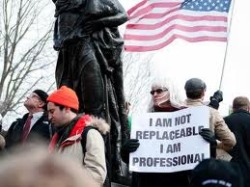The 21st Century Retooling of the Church – Part XXXIV
 What’s in your toolbox? Usually old tools, tools of stability, screw drivers, pliers, a hammer, a vice grip, a level, etc. Recently specialty tools have invaded my box, special screw drivers with special tips, bent tools to reach in hard to get places, and multiuse tools. Tools that were used on m 1971 Chevy Nova are useless on a new 2011 car. If you buy an “ensemble yourself” piece of furniture, unique screws, bolts, and tools are included.
What’s in your toolbox? Usually old tools, tools of stability, screw drivers, pliers, a hammer, a vice grip, a level, etc. Recently specialty tools have invaded my box, special screw drivers with special tips, bent tools to reach in hard to get places, and multiuse tools. Tools that were used on m 1971 Chevy Nova are useless on a new 2011 car. If you buy an “ensemble yourself” piece of furniture, unique screws, bolts, and tools are included.  Why, as a church, do we still use “medieval tools” or even “last century tools” when facing the 21st Century when we do church? Why is the Church known as one of society’s institutions that does not embrace change quickly or effectively? Only a few decades ago did the Roman Catholic Church allow mass to be done in a native tongue rather than in Latin, yet maintains the same structure for centuries? “This is the way we have always done it,” is often the mantra for those who do not embrace change within the church. Often the church boasts of rich “traditions” rather than effective ministry.
Why, as a church, do we still use “medieval tools” or even “last century tools” when facing the 21st Century when we do church? Why is the Church known as one of society’s institutions that does not embrace change quickly or effectively? Only a few decades ago did the Roman Catholic Church allow mass to be done in a native tongue rather than in Latin, yet maintains the same structure for centuries? “This is the way we have always done it,” is often the mantra for those who do not embrace change within the church. Often the church boasts of rich “traditions” rather than effective ministry.
So what should the Church’s toolbox contain if it is to be retooled?
 Evangelist: Instead of the old tool of mass evangelism as “Crusades” in sports arenas or special events held in church buildings, the retooled version may look like mass evangelism through social networking and the internet, but the power of personal evangelism through one on one communication and care is still the most effective. In an age of impersonal electronic communication, actual one on one, face to face friendship and care is still the most powerful. Also the evangelistic tool must be a “creative” tool, being adaptable to new situations and change rather than already defined strategies to be copied.
Evangelist: Instead of the old tool of mass evangelism as “Crusades” in sports arenas or special events held in church buildings, the retooled version may look like mass evangelism through social networking and the internet, but the power of personal evangelism through one on one communication and care is still the most effective. In an age of impersonal electronic communication, actual one on one, face to face friendship and care is still the most powerful. Also the evangelistic tool must be a “creative” tool, being adaptable to new situations and change rather than already defined strategies to be copied.
 Pastoral: The term “pastor” will be retooled from being defined as a “professional Christian” to a passion or gifting to care for the development and nurture of believers toward being more Christ-like. Everyday believers can exhibit their “pastoral” gifting of service to help develop the new converts birthed by the evangelist. It will be common believers reaching out to new and developing believers in an effort to grow together in to the maturity of Christ.
Pastoral: The term “pastor” will be retooled from being defined as a “professional Christian” to a passion or gifting to care for the development and nurture of believers toward being more Christ-like. Everyday believers can exhibit their “pastoral” gifting of service to help develop the new converts birthed by the evangelist. It will be common believers reaching out to new and developing believers in an effort to grow together in to the maturity of Christ.
 Teacher: As an educator by profession, I have been taught and experienced that lectures are the most ineffective way to teach, particularly in an era where unlimited information is a click away on one’s computer. In an intellectual, data driven, test oriented, educational degree based society today, culturally and theologically the Western world needs to move away from teaching by lecture (sermons) “about” subjects to “experiencing” subjects by living, or actual application, of the principles to be learned. Jesus never founded an intellectual theological institution to educate his followers, but he walked and talked with them personally for three years, teaching them kingdom principles for their practical lives. The sermon may become a relic of a tool replaced by field trips outside the established church building into the world the Church has been commissioned to serve.
Teacher: As an educator by profession, I have been taught and experienced that lectures are the most ineffective way to teach, particularly in an era where unlimited information is a click away on one’s computer. In an intellectual, data driven, test oriented, educational degree based society today, culturally and theologically the Western world needs to move away from teaching by lecture (sermons) “about” subjects to “experiencing” subjects by living, or actual application, of the principles to be learned. Jesus never founded an intellectual theological institution to educate his followers, but he walked and talked with them personally for three years, teaching them kingdom principles for their practical lives. The sermon may become a relic of a tool replaced by field trips outside the established church building into the world the Church has been commissioned to serve.
 Prophet: Instead of thinking as a prophet as an isolated old testament figure hiding in the wilderness or causing waves that would want a king to banish him, or even an isolated new testament figure giving prophetic words, the new retooled prophet would look like a believer in Jesus Christ who has learned to listen to the small voice of the Holy Spirit, knows the heartbeat of the Father, and is willing to be obedient to what he has seen and heard. Also the retooled prophet is not “isolated” from the body of Christ, but an integral part of the body of Christ by aiding through prophetic evangelism, aiding the pastoral effort through worship, prophetic teaching, and being the spiritual eyes and ears for the body as a whole.
Prophet: Instead of thinking as a prophet as an isolated old testament figure hiding in the wilderness or causing waves that would want a king to banish him, or even an isolated new testament figure giving prophetic words, the new retooled prophet would look like a believer in Jesus Christ who has learned to listen to the small voice of the Holy Spirit, knows the heartbeat of the Father, and is willing to be obedient to what he has seen and heard. Also the retooled prophet is not “isolated” from the body of Christ, but an integral part of the body of Christ by aiding through prophetic evangelism, aiding the pastoral effort through worship, prophetic teaching, and being the spiritual eyes and ears for the body as a whole.
 Apostle: Some teachers in Christian circles teach that the apostolic died when the last first century apostle physically died. I am sorry, but the Holy Spirit has resurrected the apostolic with power. The apostolic will not be a “mantle of office” occupied by Senior Pastors or self proclaimed Church leaders, but a passion, a gifting, a point of view that would “see over” what the Holy Spirit is doing in the body of Christ, and encouraging and releasing the other four passions of giftings to prepare, equip, and develop Christians to be more Christ-like while bringing unity to the body of Christ, something the Church has not experienced in centuries.
Apostle: Some teachers in Christian circles teach that the apostolic died when the last first century apostle physically died. I am sorry, but the Holy Spirit has resurrected the apostolic with power. The apostolic will not be a “mantle of office” occupied by Senior Pastors or self proclaimed Church leaders, but a passion, a gifting, a point of view that would “see over” what the Holy Spirit is doing in the body of Christ, and encouraging and releasing the other four passions of giftings to prepare, equip, and develop Christians to be more Christ-like while bringing unity to the body of Christ, something the Church has not experienced in centuries.
So the tools in the Church’s toolbox may need restructuring for today’s specialized world, diverse cultures, and differences in a society that is beginning to think world wide instead of local. Local corner churches with their spiral steeples are being replaced by practical multi-use buildings, or no buildings at all in a Facebook, MySpace, web sited, internet world. Apple II E computers are dinosaurs, lap tops are being challenged by I-phones, and software changes yearly in a technological savvy world, yet the Church drags its feet to retool itself to meet this changing world. We need to reevaluate as a Church what is in our toolboxes and how effective those tools are, then being open to add new, specialized tools to meet the needs of the 21st Century generation.













































